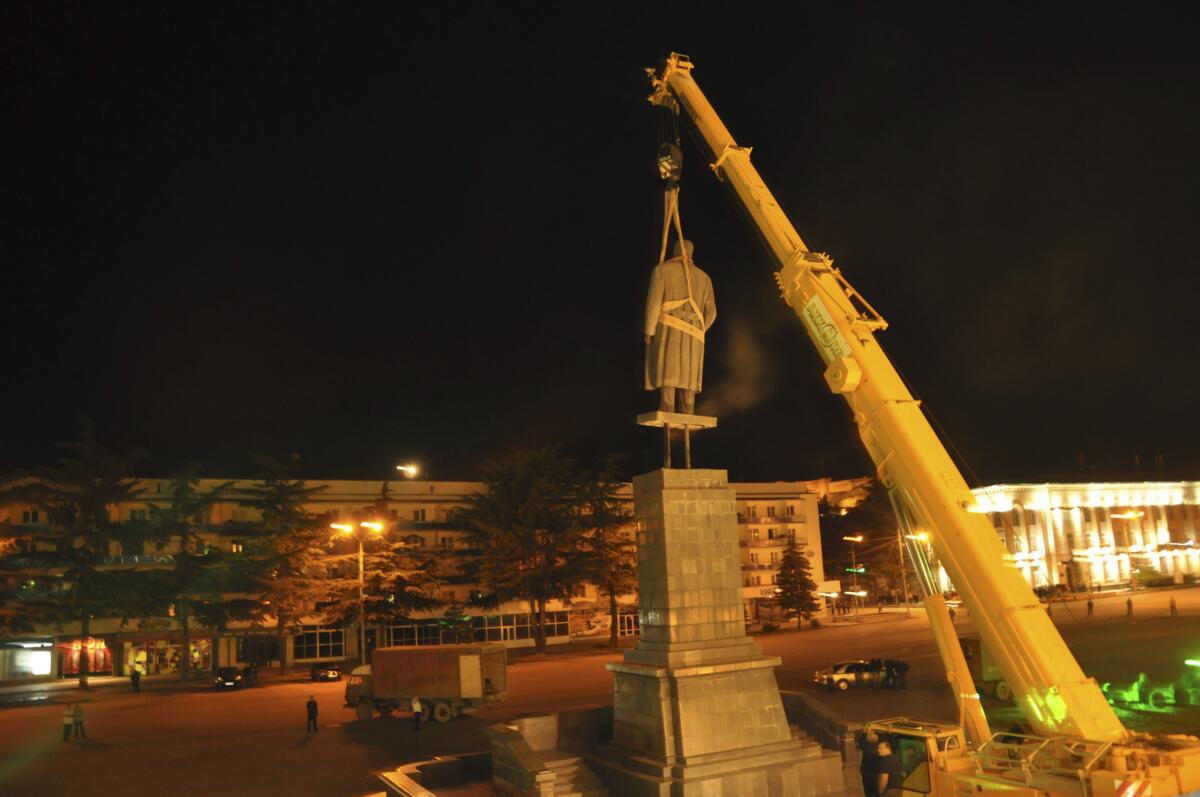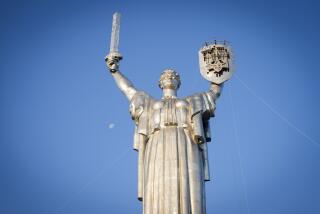Monument to Soviet dictator Stalin to be restored in Georgia

- Share via
A bronze statue of Soviet-era dictator Josef Stalin will soon rise five stories over the museum dedicated to his brutal legacy in the small Georgian town of Gori, where he was born in 1878, the Culture Ministry in the former Soviet republic announced Tuesday.
The 20-foot-tall statue was toppled in the dark of night from its 30-foot pedestal three years ago as vestiges of the totalitarian era in the Caucasus republic were eradicated by pro-Western President Mikheil Saakashvili. It has since been lying on the grounds of a military base in Gori.
The monument previously stood in Gori’s central square but plans for its reinstatement indicate it will be erected in the yard of the Museum of Stalinism adjacent to the small home in which the dictator was born.
The Culture Ministry recommended that the new monument be placed at the museum site but noted the decision on where and when to restore it is up to the local municipality, said Keti Ebanoidze of the ministry’s monument protection office.
Saakashvili said he was outraged by the town’s decision and the Culture Ministry’s approval of the plan to have the controversial statue back in place by Dec. 21, the day Gori’s local government recognizes as Stalin’s date of birth.
“Restoring the Stalin monument in the 21st Century is an unimaginably barbaric, anti-Georgian, anti-national, anti-state act, because it puts Georgia in international isolation,” the president, who leaves office in October, was quoted as saying by the Civil.ge website that provides English-language news from Georgia.
Saakashvili and his United National Movement Party led the independent republic’s purge of Stalin tributes over the past decade. But the president’s authority has been substantially weakened by a constitutional reform that shifted power to the prime minister’s office, currently held by billionaire Bidzina Ivanishvili, who reportedly backed the Gori administration’s campaign to restore the monument to Stalin.
Statues were erected across Soviet-dominated Eastern Europe in homage to the Georgian strongman who ruled the Soviet Union from 1924 until his death in 1953, and was responsible for the deaths of millions of his own people. Most of the statues were removed during the anti-communist uprisings two decades ago, when Stalin’s crimes against perceived opponents and the truth about the deadly consequences of collectivizing agriculture were exposed.
But in his native Georgia, many still regard Stalin, whose legacy is referred to elsewhere as The Terror, as the guiding force that propelled the Soviet Union to victory in World War II and built it into a superpower to rival the United States.
A March report by the Carnegie Endowment for International Peace detailed the complicated attitudes Russians and the peoples of the Caucasus region have toward the leader whose name has come to be synonymous with institutionalized brutality and oppression.
The Carnegie survey found that 68% of Georgians considered Stalin “a wise leader who brought the Soviet Union to might and prosperity,” although a nearly equal proportion said they wouldn’t want to live in a country ruled by Stalin.
While there are records at the Uspensky Church in Gori that list the dictator’s day of birth as Dec. 18, 1878, a change in the calendar observed in the region and Stalin’s own revision of his birthdate changed it to Dec. 21, 1879.
ALSO:
Militants storm Pakistani prison, free 248 prisoners
Beyond his Moscow airport limbo, indignities await Edward Snowden
Twitter: @cjwilliamslat
More to Read
Sign up for Essential California
The most important California stories and recommendations in your inbox every morning.
You may occasionally receive promotional content from the Los Angeles Times.














